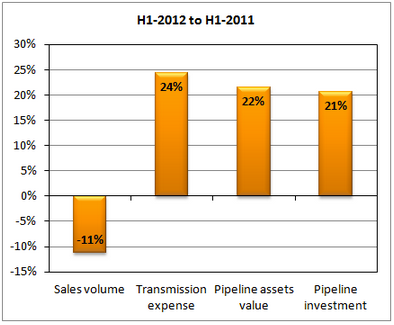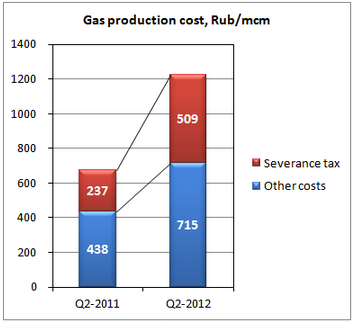Gazprom Reports Growing Costs at Decreasing Gas Sales
Gazprom's financial results for H1-2012 show significant growth of nearly all cost components and decrease of gas volumes sold to all markets. Compared to H1-2011, volumes of natural gas sold in Russia dropped 6%, former Soviet Union 29% and exports to other countries (mostly Europe) 10%. Totally, Gazprom sold 11% less gas than in the same period of 2011. Despite the growth of price in all market segments, gas sales revenue decreased 3%.
Observing dropping sales, Gazprom is steadily increasing its capital investment. The value of gas transportation assets is 22% higher than in the end of June 2011 and the total gas transmission expense is up 24%. A vast majority of new pipeline projects of Gazprom do not generate additional profits for the company's shareholders. On the contrary, these pipelines reduce the profits.
It worth noting that the state budget reimburses Gazprom's operational losses at the recently commissioned Sakhalin-Khabarovsk-Vladivostok pipeline (Rub 11.2 Billion in 2012). The size of gas market at the end of this 467-billion-rouble pipeline is still uncertain. Nevertheless, Vladimir Putin ordered Gazprom to build another 3200-km pipeline to Vladivostok. Total cost of the proposed Yakutia-Khabarovsk-Vladivostok pipeline is estimated at Rub 770 Bn. The full-scale construction of new gas pipelines has just started. In the mid-term, the annual pipeline investment is unlikely to go down until Gazprom runs out of cash.

Source: Gazprom

Source: Gazprom
Things are no better at the production side. Gas production cost in Q2-2012 was 81% higher than in the same period of 2011. Excluding the effect of severance tax raise, the production cost went up 63%.
By huge overinvestment during the period of uncertainty, Gazprom executives expose the company to tremendous risk. After the commissioning of South Stream and its feeding pipelines, the delivered cost of Russian gas at the EU border is very likely to exceed $14/MMBtu. The price in Europe may not be that high and the federal budget of Russia may not be able to reimburse all losses caused by excessive pipeline construction. Gazprom is getting closer to the point of no return.
Mikhail Korchemkin
Dr. Mikhail Korchemkin is the founder of East European Gas Analysis (EEGA), an independent consulting firm based in Malvern, Pennsylvania, USA. EEGA specializes in cost-benefit and financial analysis of natural gas projects in the former Soviet Union and Eastern Europe


